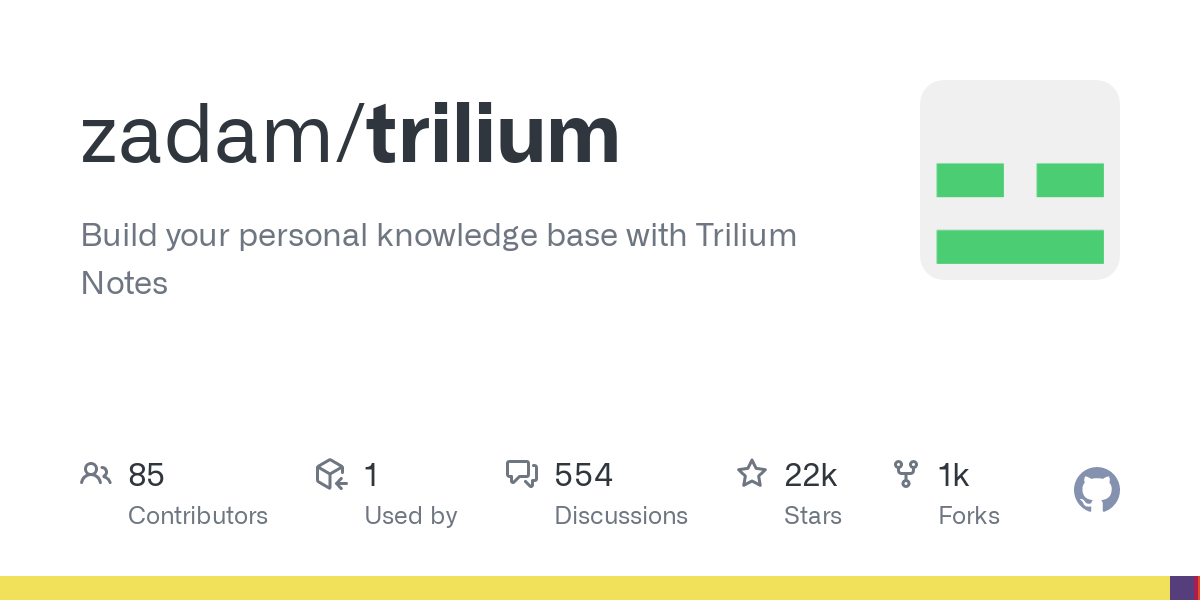I mean Trilium is fantastic app, lots of potential but the developer is struggling on his own, maybe it’s because it’s younger than logseq or maybe because is open source compared to obsidian. I think it’s the best note-taking/knowledge-base/second-brain i know it virtually could link everything you posses toghter to create a gigantic wiki, so much potential. Plus it has its own self hostable syncing server and web app. Guys give it a look and tell me what you think
Looks very interesting. Apparently it uses its own file format. This is a little bit of a problem, because it forces you to rely on this software to access your notes, even if an export to Markdown is possible. But often times these exports of large note databases are not tidy, they may be missing features/information that didn’t export well.
So i personally would only ever use a note taking app that is based on text files. This of course is harder to manage, but can be done, like VimWiki or Obsidian have shown.
Maybe if it could be extended for text file as basic storage, it could get a broader user base.
For me a serverless mobile app is breaking point for me.
I get it
I’d want to love it…
but as ridiculous as it sounds, for something like this to be really useful to me I unfortunately need a mobile app. a web-app seems hard to realize for a real e2e encryption & sync - for my scenario :(
I’m aware how much effort this is already… it looks good but as much as I want to use it, I can’t due to my workflow requiring a mobile device app (iOS in my case)
but it does look really promising!
It looks like it’s built with Electron which should run natively on mobile. Porting it as a mobile app wouldn’t be very difficult.
Edit: Upon further investigation, it actually has a built-in mobile frontend. You’d just have to run an instance on a server and access it from your mobile device.
Yes it has the web app but a regular app would be nice
expired
I don’t have the skills to properly answer, sorry.
expired
He does, what is his @? Thank you for the information.
expired
I see, thanks
expired
Amazing man, I’m so happy for you, I will check out minio too seems intersting, good luck with your research!
I really can’t tell - does it work on top of Markdown flat files or not? Based on the mention of an exporter, I’d guess not.
Part of the reason I moved from TiddlyWiki to Obsidian was to get my writing into plain text files, so anything that doesn’t interface with the OS file system is off the table for me from the get-go. (Part of the reason I care about this is so that I’m not locked into a specific app and can use VS Code to browse and edit as needed, or build a static site from my files, etc.)
Unfortunately no for now, it uses a database that renders it more powerful but can import and export markdown effortlessly. Editing directly in markdown should be a feature tho for those who want to use file systems
This could be a very important point for why it isn’t more used. For example, i only use markdown files, which allows me to manage them in git, edit and navigate via VimWiki, and visualize in Obsidian.
Is this similar to Notion?
Seems like it misses some key features from Notion. Notion is awesome. Trilium seems cool too, but it’s not enough to make me leave Notion.
Have you tried Anytype? It’s a combination of Notion and Obsidian, and it’s end-to-end encrypted, and everything is stored on your device. Still in alpha, but it has a lot of features already. Because it’s in alpha, they only give access to people who attend an online presentation of the app. But it’s worth it. And as soon as it exits alpha, the plan is to open source it.
How is this better than zim? Is this in the Debian repos?
I can’t compare, I never used Zim, sorry. If I remember correctly it is, I personally got it with flatpack.
Ah, if it’s only available on flatpaks, that’s why few people know about it.
Flatpak is a very insecure method to download software BTW, you probably should avoid it
Edit: It’s curious that I’m getting downvoted for stating a fact. It seems a lot of flatpak users don’t understand security. But that’s kinda the point: even the flatpak developers don’t understand the difference between integrity and authenticity
Flatpak currently does not provide authenticity, and one developer made it clear that he doesn’t understand why that matters in the above ticket that requested signatures of packages back in 2016. It’s been 7 years and still they haven’t fixed this. I don’t think the flatpak team understands or cares about security.
Flatpaks aren’t any less secure than any other installation option, where did you get that idea from?
This is misinformation. Flatpaks are far less secure than installing from apt. All packages installed from apt are cryptographically signed. This isn’t the case with flatpaks.
On this topic… Why doesn’t anyone talk about Standard Notes? It’s free, E2E encrypted, has mobile apps, and supports Markdown (for a reasonable subscription fee). Kinda checks every box…
Why not Joplin? It’s free.











